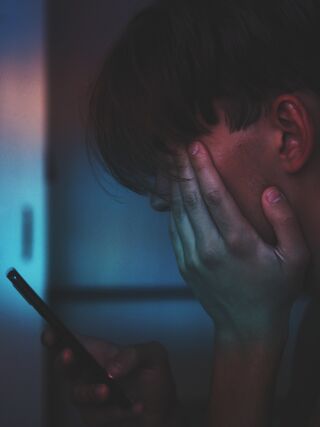OCD
Internet Use Disorder May Be Linked to OCD
Hoarding and obsessive symptoms are hallmarks of Internet use disorder.
Posted September 29, 2021 Reviewed by Gary Drevitch

A new article published in Frontiers in Psychology offers insight into “Internet use disorder” — a condition characterized by excessive or poorly controlled urges and behaviors relating to Internet use that causes distress or interferes with normal life functioning. According to the authors of the research, a team led by Tania Moretta of the University of Padova in Italy, it is more likely to affect people who exhibit obsessive-compulsive symptoms.
To arrive at this conclusion, the researchers recruited 104 Italian adults to participate in an in-person survey. The researchers asked participants to fill out a series of questionnaires, beginning with an Italian version of the Internet Addiction Test, shown here:
Answer the following 20 questions on a scale from 0 (does not describe me) to 5 (describes me well) to measure problematic internet use. Add your scores together. Values of 30 or less indicate a normal level of internet consumption, scores between 31 and 49 indicate mild addiction, scores between 50 and 79 indicate moderate addiction, and scores of 80 or higher reflect severe internet dependency.
- Do you find yourself saying “just a few more minutes” when online?
- Do you fear that life without the Internet would be boring, empty, or joyless?
- Do you try to cut down the amount of time you spend online?
- Do you snap, yell, or act annoyed if someone bothers you when you are online?
- Do you find that you find yourself anticipating when you will go online again?
- Do you feel preoccupied with the Internet when offline, or fantasize about being online?
- Do you feel depressed, moody, or nervous when you are offline, which goes away when you are back online?
- Do you lose sleep due to late-night log-ins?
- Do you try to hide how long you’ve been online?
- Do you choose to spend more time online over going out with others?
- Do you form new relationships with fellow online users?
- Do you prefer the excitement of the Internet to intimacy with your partner?
- Do you neglect household chores to spend more time online?
- Do you find that you stay online longer than you intended?
- Do others in your life complain to you about the amount of time you spend online?
- Does your job performance suffer or productivity suffer because of the Internet?
- Do your grades or schoolwork suffer because of the amount of time you spend online?
- Do you block out disturbing thoughts about your life with soothing thoughts of the internet?
- Do you check your email before something else that you need to do?
- How often do you become defensive or secretive when anyone asks you what you do online?
The researchers then requested that participants fill out scales measuring impulsivity, anxiety, depression, and stress, obsessive-compulsive symptoms, and the use of alcohol and cannabis. Finally, participants completed a questionnaire about their demographic characteristics, health status, and medical history.
The researchers found that participants who scored higher on the Internet Addiction Test tended to exhibit hoarding and obsessing symptoms from the obsessive-compulsive questionnaire. They also exhibited higher levels of depression.
They did not find evidence that Internet use disorder was linked with other problematic psychological or behavioral characteristics, such as increased anxiety, impulsiveness, or substance abuse.
“Overall, these findings suggest that Internet use disorder may be characterized by a pattern of symptoms resulting from a disturbance of networks and mechanisms underlying anxiety/mood disorders and OCD,” conclude the authors. “Based on current knowledge of this problematic behavior, an intervention should consider increasing emotion regulation capacity and awareness of the problematic behavior, coping with negative affect, and motivating individuals to consider goals different from Internet usage as the targets.”
References
Moretta T and Buodo G (2021) The Relationship Between Affective and Obsessive-Compulsive Symptoms in Internet Use Disorder. Front. Psychol. 12:700518.


